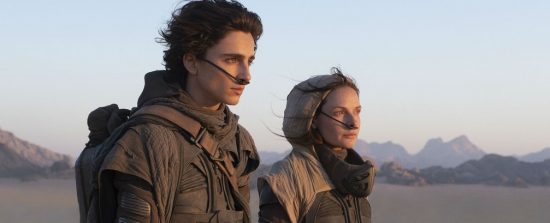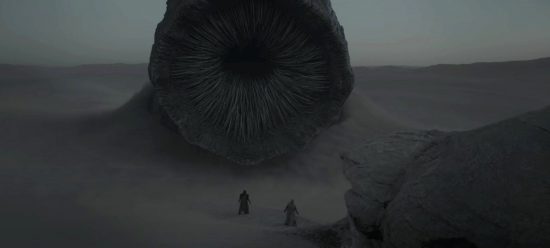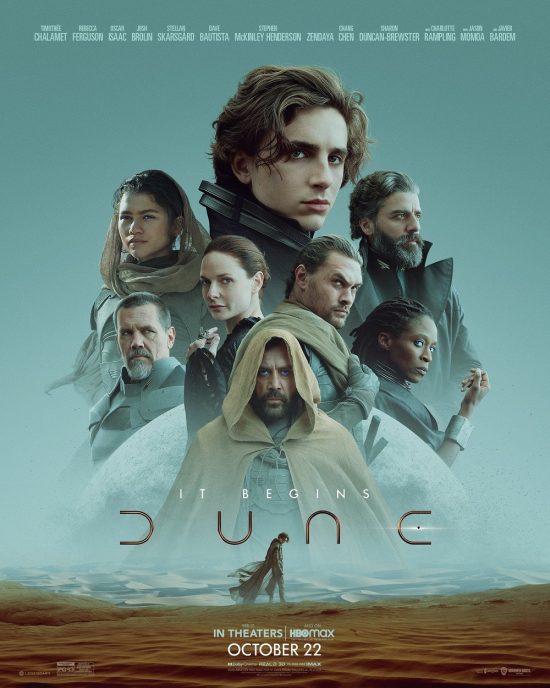Review: Dune – “It might just be the epic sci-fi saga we’ve been waiting for”
Timothée Chalamet’s pale and angular face looms large, camera tight on his furrowed brow, inner cogs turning, perfect curls twisted into a dark halo. The camera swings to Rebecca Ferguson’s face, where her fear, love and devastation are as clear as her freckles, before it swings again, to a never-ending desert vista, dust sparkling in the air. Welcome to Dune…part one.
There are two ways in which to remake a movie of Dune, based on Frank Herbert’s first book; one, as a love letter to hard science fiction with a dash of medieval politics, and the other, as an audio-visual spectacle bringing distant landscapes, planetary tech and family legacy into an emotionally resonant story. Luckily, Warner Bros. got themselves a director who does both, and Denis Villeneuve feels the right choice to placate all sections of the audience.
Of course, there’s still a fair amount of confusion in this adaptation of an intricate story (and some explanatory oversight to be picked apart by Herbert purists), but it rarely matters, because this sweeping story captures a mood. Villeneuve squeezes the dry book text and wrings a wellspring of feeling, exactly as he did with his sci-fi adaptations Arrival and, to a lesser extent, Blade Runner 2049.
Unlike David Lynch‘s earlier (perhaps truer?) version, this Dune lays out the facts in a simpler, lengthier manner, championing action over science. This film owes a lot to Game of Thrones, which helped establish a public fervour for alternative interpretations of feuding English Royalty.
A primer for the uninitiated: Chalamet plays Paul Atreides, the heir to a green planet called Caladan and a great dynasty via his father Lord Leto (Oscar Isaac) and mother Jessica (Ferguson). Leto hasn’t married Jessica because she comes from a strange order of, basically, space witches called the Bene Gesserit that get things done by using their cool, supernatural mind-control voices. Leto is ordered by the unseen Emperor of the known universe to hotfoot it to the dust planet Arrakis, recently vacated by another pseudo-royal family, the Harkonnen, led by the Baron (Stellan Skarsgård) a textbook bad guy – overblown, hairless and sweaty. The Harkonnen are bitter, having had a great time mining the planet’s main resource Spice, an instantly addictive psychedelic drug that prolongs life and turns the eyes violet. What Villeneuve forgets to mention is that Spice is officially called Melange (LOL), and is used to pilot wormhole-jumping space tech and aid the Bene Gesserit in essential universe-defining soothsaying. Arrakis’ indigenous population are known as the Fremen, an ancient culture that has hounded the Harkonnen off-planet, aided by GIANT SANDWORMS! Paul heads to Arrakis with his family, eager to meet an unknown woman with violet eyes who consumes his dreams (Zendaya, so underused) while learning that his existence is all part of a grand “chosen one” plan, where he might just be the next Harry Potter or he might just be the next Neville Longbottom. But the Harkonnen won’t go quietly.
Phew! Not everybody is going to enjoy embracing new sci-fi terms at the movies, perhaps fatigued by the current age of superhero narrative, but Villeneuve balances the space maths with glorious scenery, scary monsters and amazing space helicopters. Dune is a truly beautiful-looking film, indulging in some of the finest visual landscaping the big screen has ever seen. The costumes are stunning, the casting diverse and the characterisation pretty decent as multiple people and concepts are fed to the viewer. The load is lightened by the awesome supporting cast, with Jason Mamoa and Josh Brolin bringing the combat training and Charlotte Rampling bringing the mind trickery. Dune is, surprisingly, as much Ferguson’s film as Chalamet’s. She strikes a perfect balance between otherworldliness and sinisterism, lighting up the screen. Less surprisingly, this is Chalamet’s best role to date, and Isaac perfectly rounds out the complexities of this burden-laden family.
There is but one real criticism of Dune. Villeneuve’s thirst for a sequel makes it a touch too long. Dune sets up so much exposition in its first half that all plot gets shoved into the second, and (minor spoiler) the film kind of ends with very little of the story revealed. The casual cinema-goer might balk at having to commit to yet another franchise. But for us Duneheads, it’s only the beginning of what might just be the epic sci-fi saga we’ve been waiting for.












